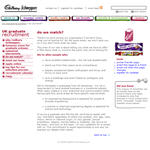How can you welcome the right person, while also politely explaining to others that perhaps this isn’t the right career for them?

Your prospective recruit has managed to find out something about your company, and that they would like to work for you.
Their next step will be to decide whether you are, in fact, looking for someone like them. And, if they are the right person, you need to be sure that they understand that and do, in fact, put in an application.
Step 3: “Is this company looking for ‘me’?”
By clearly defining the characteristics of the person you are looking for, you are more likely to:
- save money (by not having to deal with inappropriate applications)
- find the right person (because they will see the potential match).
The simplest technique to handle this is just tell people up front – explain very clearly what you are looking for.
This information is often found in the lowest level of detail, in the job description (if there is one online), but if there is a more general description that applies to all applicants, you should consider putting it up front. This may help reduce inappropriate applications, or save your visitors some time.
For example, if you won’t consider someone who can’t drive, or if all your graduate applicants, say, are expected to travel for the first three years, then making this clear will help people assess whether they are, in fact, the person you are looking for.
An example is Cadbury Schweppes, who have a page explicitly called ‘do we match?’ (see above).
RWE do something very similar for their international graduate programme, on their page called ‘what we require’. They state:
… we look for college graduates from all disciplines, in particular those candidates with an economic science background, that have had outstanding exam results within the average period of study, and are interested in strategic challenges and the implementation of an international change process. You should also be prepared to be trained in areas outside of your expertise.
Further requirements include strong English skills as well as fluent German language. Additionally, you should already have gained practical experience, preferably outside of your home country.
That should eliminate a few people …
Lucy is Editor at Corporate Eye


